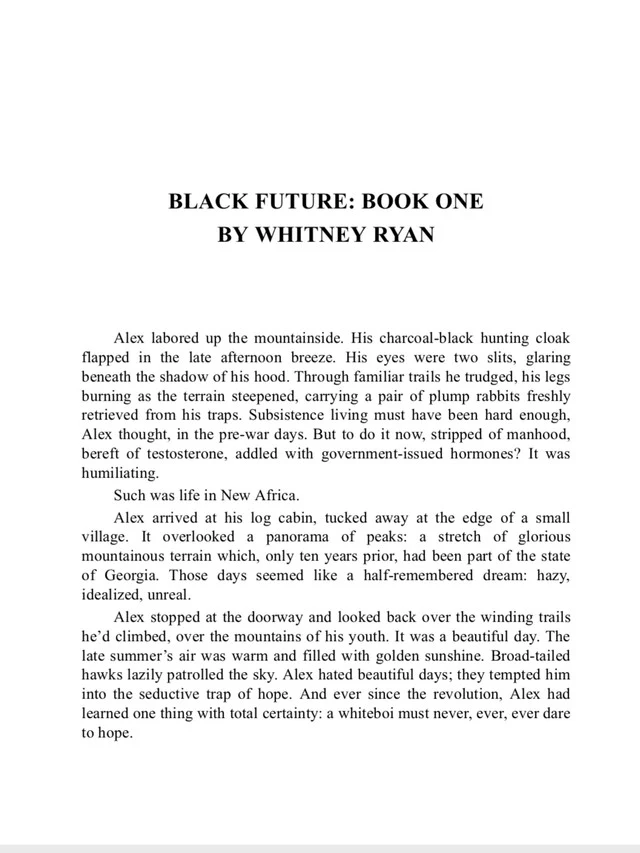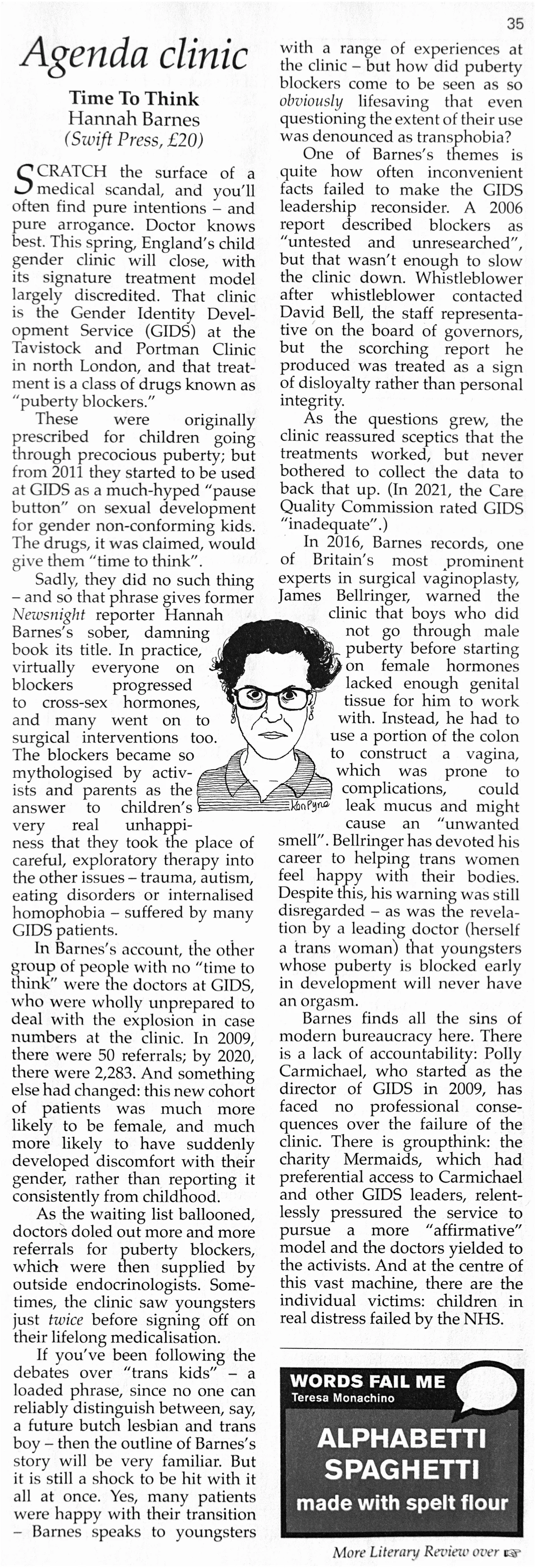- 13
- 18
Welcome back to our Black Future story hour, dramatards. Page 2 got spoiled by some  so I'm skipping right to the third page.
so I'm skipping right to the third page.
editor's note: the author has introduced a duo of underage characters. I have not read ahead, so if this turns out to be a pederast book we will have to read How I sued Taylor Swift by one R. Greer instead
Anyway, you, the fine  of rdrama, are tasked with guessing what happens on the following page. The closest guess will receive 10 marseybux. I'll update the OP with the best guesses. I'll keep track of any guesses before the spoilers inevitably drop.
of rdrama, are tasked with guessing what happens on the following page. The closest guess will receive 10 marseybux. I'll update the OP with the best guesses. I'll keep track of any guesses before the spoilers inevitably drop.
Here's a link to page 3, i dont want to upload the files locally 
NSFW
The momentum does not let up  every word carefully and masterfully chosen, Whitney Ryan is showing us the lives of her dramatis personae in a strange and captivating world
every word carefully and masterfully chosen, Whitney Ryan is showing us the lives of her dramatis personae in a strange and captivating world
Dear readers, what do you think happens next?
Guess 1:
I'm gonna guess Alexa is going to hear the news that the kangs are coming to her village, and he's going to make way toward the village to save her sister
Guess #2
There's a knock on the door and it's a basketball government official. He comes in, eats the rabbits, fricks the sissy's wife, and leaves.
- 1
- 5



By far the most r*ddit  book I've read. Premise was alright, but it was predictable, MC was oblivious, big butt plotholes, and I didn't really like any of the characters.
book I've read. Premise was alright, but it was predictable, MC was oblivious, big butt plotholes, and I didn't really like any of the characters.
- 69
- 23
I want some good fantasy recommendations, but so much of the genre is unbearable. I've identified two main reasons why, though I'm sure there are also many others.
- YA desperately written for a movie deal and/or teenaged foids
 by older foids
by older foids  Can't stand this garbage and I doubt I need to explain why.
Can't stand this garbage and I doubt I need to explain why.
- Conversely I can't get through a lot of "standard" fantasy written by moids who don't see the difference between a novel and a DnD campaign.
 Characters and plot usually take a backseat to pointless wiki lore and unending exposition. I'd say I like worldbuilding but it should be done more naturally than vomiting paragraphs. The plot shouldn't stop because the author needs us to know every detail about the temple or whatever we just passed by. The majority of these settings will also be shameless ripoffs of Tolkien and/or DnD with nothing new to offer.
Characters and plot usually take a backseat to pointless wiki lore and unending exposition. I'd say I like worldbuilding but it should be done more naturally than vomiting paragraphs. The plot shouldn't stop because the author needs us to know every detail about the temple or whatever we just passed by. The majority of these settings will also be shameless ripoffs of Tolkien and/or DnD with nothing new to offer.
I need some fantasy recs that avoid these pitfalls. I'm interested in finding any of the following
- Unique main characters. Examples of anything that made a particular protagonist stand out above the genre.
- Same with settings. Any that stood out (ideally right from the get-go, and not just because you'd gotten used to it after eight books)
- Stories that were concise while still being good. I'm not against wordier entries, but I think a lot of fantasy authors have trouble with brevity. I'm wondering if anyone knows of exceptions who still managed to pull off something creative.
- 39
- 49
- FamilyGuyShill : porn = funny
- TND-Total_Nazi_Death : it is if black people are involved
- 37
- 47
Idea shamelessly stolen from @kaamrev
I'll be reading 1 page of the modern intersectional classic BLACK FUTURE each week. You, the fine  of rdrama, are tasked with guessing what happens on the following page. The closest guess will receive 10 marseybux. I'll update the OP with the best guesses.
of rdrama, are tasked with guessing what happens on the following page. The closest guess will receive 10 marseybux. I'll update the OP with the best guesses.
Here's a link to page 1, i dont want to upload the files locally 
Already we are off to a riveting start as our effeminate hero uhhhh  climbs a hill. Incredible prose, excellent pacing, no wonder Whitney Ryan has become a household name and international phenomenon.
climbs a hill. Incredible prose, excellent pacing, no wonder Whitney Ryan has become a household name and international phenomenon.
Dear readers, what do you think happens next?
Guess 1:
Meet the members of his family and more expository dialog.
Guess 2:
Alex reminisces about life before New Africa was established
Guess 3:
We'll find out about his sister and how he has always had incestuous feelings for her (mayos and incest marseymanysuchcases:)
Guess 4:
My guess is the next page will be explaining what the revolution was and how it got to this stage
Guess 5:
the strong ARFIKAN BVLL plows his bussy
Guess 6:
@The_Hyperborean_Wakandan
We will learn about the background of the world
Guess 7:
We'll have a hard cut to the New Africa senate as the BLACK BVLLS discuss the Trade Federation's recent blockade of Nabussy.
- 2
- 31
- 18
- 62
When I meet a pretty girl and beg her: "Be so good as to come with me," and she walks past without a word, this is what she means to say:
"You are no Duke with a famous name, no broad American with a Red Indian figure, level, brooding eyes and a skin tempered by the air of the prairies and the rivers that flow through them, you have never journeyed to the seven seas and voyaged on them wherever they may be, I don't know where. So why, pray, should a pretty girl like myself go with you?"
"You forget that no automobile swings you through the street in long thrusts; I see no gentlemen escorting you in a close half-circle, pressing on your skirts from behind and murmuring blessings on your head; your breasts are well laced into your bodice, but your thighs and hips make up for that restraint; you are wearing a taffeta dress with a pleated skirt such as delighted all of us last autumn, and yet you smile--inviting mortal danger--from time to time."
"Yes, we're both in the right, and to keep us from being irrevocably aware of it, hadn't we better just go our separate ways home?"
What was it with him and jealousy over Indians? He has another short story called "The Wish To Be a Red Indian"
- 8
- 15
It seems like everywhere is closed to submissions right now. Metaphorosis manuscript guidelines are bizarre, and I could only find Bourbon Penn open to spec fic. Bunch of other mags seem to open their submissions once a year at best.
Seemed better last year honestly, is self pub actually better or am I looking in the wrong places
- 69
- 48
normally i wouldn't tell people to give up on their dreams but come the frick on 💀💀
in typical reddit fashion, everything is so so bad.  the advice, the depressed writers looking for people to validate their awful ideas. i distinctly remember one poster who wanted to know if people wanted to read about dinosaur bones.
the advice, the depressed writers looking for people to validate their awful ideas. i distinctly remember one poster who wanted to know if people wanted to read about dinosaur bones.  that's it. no mention of characters, no worldbuilding, no paleontologist murder mystery set in the heart of the african jungle. if you can't convince yourself, why should we care?
that's it. no mention of characters, no worldbuilding, no paleontologist murder mystery set in the heart of the african jungle. if you can't convince yourself, why should we care?  here's a quote from Adaptation (2002):
here's a quote from Adaptation (2002):
People are murdered every day. There's genocide, war, corruption. Every fricking day somewhere in the world somebody sacrifices his life to save somebody else. Every fricking day someone somewhere takes a conscious decision to destroy someone else. People find love, people lose it. For Christ's sake a child watches her mother beaten to death on the steps of a church! Someone goes hungry, somebody else betrays his best friend for a woman. If you can't find that stuff in life, then you my friend don't know crap about life!
- 4
- 16
Irish Independent, by Stella O'Malley
February 19 2023, A modern medical scandal: What really went wrong at the UK's controversial Tavistock gender clinic? - Independent.ie
The journ*list Hannah Barnes first learnt about issues at the Gender Identity Development Services (Gids) in the Tavistock and Portman NHS Foundation Trust in London when she was a journ*list reporting on the issue for Newsnight at the BBC.
As she delved into the details, she felt compelled to write Time to Think: The Inside Story of the Collapse of the Tavistock's Gender Service for Children, an exposé that brings us deep inside the murky world of psychologists who fast-tracked thousands of children onto a potentially unnecessary medicalised pathway.
Barnes opens the book with a gripping timeline of events that details a series of raised concerns, complaints, court cases and missed opportunities.
There was a fundamental flaw within the service as it was never clarified whether clinicians should operate from the basis of a belief in gender identity theory, which argues that adults should facilitate the transition of every child who wants it, no matter what age, or if they should take a developmental model of understanding, where medical transition is just one of many ways to alleviate gender-related distress.
The first concerns about Gids were raised by the psychoanalyst Sue Evans in 2005, however the subsequent report was filed and ignored for 15 years.
Then, roughly ten years ago, the demographics suddenly changed and all across the world there came a sudden, unexplained and unprecedented influx of teenage girls presenting with gender-related distress.
As the numbers grew, Gids became a major source of income for the Tavistock and, from initially being a tiny outlier operating out of not much more than a broom cupboard, by 2020-2021, combined adult and child gender services accounted for a quarter of the Tavistock's income. One clinician described how it was run more like "a tech start-up" than a clinical care centre.
Considerable pressure was exerted on Gids by lobby groups such as Mermaids, which was quick to level accusations of 'transphobia' whenever reluctance was shown.
Ultimately, over a thousand children were prescribed puberty blockers. Puberty blockers stop all sexual development in a growing child and promise, as the title of the book suggests, "time to think". However this is experimental treatment and the first results of the research carried out at Gids showed that puberty blockers demonstrated a statistically significant increase in statements about self-harm and suicidal ideation, and an increase in behavioural and emotional problems for natal girls.
Moreover at least 98pc of children on puberty blockers move on to cross-s*x hormones. Critics believe that blockers effectively 'lock in' children to a medicalised identity. In one case study, 'Harriet' shows how she experienced a "honeymoon period" when she first came out as trans.
It is often noted that a diagnosis of gender dysphoria can inappropriately overshadow all other issues and, even though Harriet was self-harming, experiencing suicidal thoughts and had a difficult relationship with food, her referral to the Child and Adolescent Mental Health Services (Camhs) was dismissed in favour of her appointment at Gids.
Although she didn't ask for them, Harriet was offered puberty blockers at the first appointment, and then twice more across five appointments.
At 18 years old, she was approved for testosterone at her first appointment in the adult services. Her voice deepened and hair started to grow on her jaw and elsewhere. She underwent a double mastectomy aged 19. Then some doubts crept in. As is often the case for females who take testosterone, s*x was painful and she became prone to urinary infections.
Harriet came to realise she was a female and a lesbian.
She subsequently stopped taking testosterone and detransitioned. She now has to shave daily and has a permanently deep voice. She describes the experience like "waking up from a nightmare or regaining control of my body after someone else took over".
Barnes devotes an entire chapter to Gids in Ireland. In 2012, Gids first started seeing Irish children as part of the 'Treatment Abroad Scheme'. The numbers quickly catapulted and it was decided to stop flying children over to London; instead, from 2015, Gids ran monthly clinics in Crumlin Children's Hospital. Curiously, the scheme continues to fund this service.
The waiting lists in both Ireland and the UK became unconscionably long as lobby groups promoted the idea that only gender specialists could work with gender-distressed children. Gids clinicians became overwhelmed, with some complaining about a caseload of as many as 140 patients each.
A series of raised concerns, meetings, formal and informal complaints were summarily dismissed. Sonia Appleby, child safeguarding lead at the Tavistock, ended up lodging a whistle-blowing claim against Gids which she subsequently won in November 2021.
In August 2018, an extensive report submitted by Dr David Bell, consultant psychiatrist at the Tavistock, branded Gids "not fit for purpose". By then, some children were being prescribed puberty blockers within the first 20 minutes of their first session.
Many staff left. In July 2019, the psychologist Dr Kirsty Entwistle left the service by publishing a 2,700- word open letter to Gids director Polly Carmichael expressing concerns about traumatised, deprived, and sexually or physically abused children being inappropriately referred for puberty-blocking treatment.
Finally, in July 2022, 17 years after the first whistle was blown, the NHS announced that Gids would be closed by spring 2023 and replaced by regional centres with a greater focus on mental health. Barnes notes that Sweden, Finland and France have also recently concluded that the perceived benefits of puberty blockers do not outweigh the risks.
The situation in Ireland replicates the whistle-blowing that happened at the Tavistock. Barnes describes how clinicians at the adult National Gender Service first raised concerns in 2018 about the "clearly mentally unwell" patients transferring from the children's services in Crumlin to the adult services in Loughlinstown.
In 2019, Dr Paul Moran and Professor Donal O'Shea, both highly experienced clinicians who have helped adults medically transition for over two decades, conducted an audit of 18 referrals of Gids patients that offered accounts of young people presenting with self-harming behaviour, depression, suicidality, eating disorders, traumatic life circumstances, and a disproportionately high number of people with autism.
Dr Moran expressed his concern to Crumlin that the Gids service was "unsafe and substandard" and called for the contract to be "terminated with immediate effect". Crumlin is currently "exploring the availability of the service in other EU jurisdictions", however according to Prof O'Shea, the current situation is "awful" and he blames "institutional laziness".
Barnes's compelling account of the downfall of Gids demonstrates how pressure groups can lead well-meaning clinicians to make increasingly ill-advised decisions. Time to Think is a devastating and shocking read, a salutary tale that shows how medical scandals can happen in plain sight and complaints are ignored when nobody is quite sure about their actual position on the issue.
The Observer, by Rachel Cooke
February 19 2023, Time to Think by Hannah Barnes review -- what went wrong at Gids? | Society books | The Guardian
Hannah Barnes's book about the rise and calamitous fall of the Gender Identity Development Service for children (Gids), a nationally commissioned unit at the Tavistock and Portman NHS Foundation Trust in north London, is the result of intensive work, carried out across several years. A journ*list at the BBC's Newsnight, Barnes has based her account on more than 100 hours of interviews with Gids' clinicians, former patients, and other experts, many of whom are quoted by name. It comes with 59 pages of notes, plentiful well-scrutinised statistics, and it is scrupulous and fair-minded. Several of her interviewees say they are happy either with the treatment they received at Gids, or with its practices -- and she, in turn, is content to let them speak.
Such a book cannot easily be dismissed. To do so, a person would not only have to be wilfully ignorant, they would also -- to use the popular language of the day -- need to be appallingly unkind. This is the story of the hurt caused to potentially hundreds of children since 2011, and perhaps before that. To shrug in the face of that story -- to refuse to listen to the young transgender people whose treatment caused, among other things, severe depression, sexual dysfunction, osteoporosis and stunted growth, and whose many other problems were simply ignored -- requires a callousness that would be far beyond my imagination were it not for the fact that, thanks to social media, I already know such stony-heartedness to be out there.
Gids, which opened in 1989, was established to provide talking therapies to young people who were questioning their gender identity (the Tavistock, under the aegis of which it operated from 1994, is a mental health trust). But the trigger for Barnes's interest in the unit has its beginnings in 2005, when concerns were first raised by staff over the growing number of patient referrals to endocrinologists who would prescribe hormone blockers designed to delay puberty. Such medication was recommended only in the case of children aged 16 or over. By 2011, however, Barnes contends, it appeared to be the clinic's raison d'etre. In that year, a child of 12 was on blockers. By 2016, a 10-year-old was taking them.
Clinicians at Gids insisted the effects of these drugs were reversible; that taking them would reduce the distress experienced by gender dysphoric children; and that there was no causality between starting hormone blockers and going on to take cross-s*x hormones (the latter are taken by adults who want fully to transition). Unfortunately, none of these things were true. Such drugs do have severe side effects, and while the causality between blockers and cross-s*x hormones cannot be proven -- all the studies into them have been designed without a control group -- 98% of children who take the first go on to take the latter. Most seriously of all, as Gids' own research suggested, they do not appear to lead to any improvement in children's psychological wellbeing.
So why did they continue to be prescribed? As referrals to Gids grew rapidly -- in 2009, it had 97; by 2020, this figure was 2,500 -- so did pressure on the service. Barnes found that the clinic -- which employed an unusually high number of junior staff, to whom it offered no real training -- no longer had much time for the psychological work (the talking therapies) of old. But something else was happening, too. Trans charities such as Mermaids were closely -- too closely -- involved with Gids. Such organisations vociferously encouraged the swift prescription of drugs. This now began to happen, on occasion, after only two consultations. Once a child was on blockers, they were rarely offered follow-up appointments. Gids did not keep in touch with its patients in the long term, or keep reliable data on outcomes.
A lot of this is already known, thanks largely to a number of whistleblowers. Last February, the paediatrician Dr Hilary Cass, commissioned by the NHS, issued a highly critical interim report into the service; in July, it was announced that Gids would close in 2023. But a lot of what Barnes tells us in Time to Think is far more disturbing than anything I've read before. Again and again, we watch as a child's background, however disordered, and her mental health, however fragile, are ignored by teams now interested only in gender.
The statistics are horrifying. Less than 2% of children in the UK have an autism spectrum disorder; at Gids, more than a third of referrals presented with neurodivergent traits. Clinicians also saw high numbers of children who had been sexually abused. But for the reader, it is the stories that Barnes recounts of individuals that speak loudest. The mother of one boy whose OCD was so severe he would leave his bedroom only to shower (he did this five times a day) suspected that his notions about gender had little to do with his distress. However, from the moment he was referred to the Tavistock, he was treated as if he were female and promised an endocrinology appointment. Her son, having finally rejected the treatment he was offered by Gids, now lives as a gay man.
As Barnes makes perfectly clear, this isn't a culture war story. This is a medical scandal, the full consequences of which may only be understood in many years' time. Among her interviewees is Dr Paul Moran, a consultant psychiatrist who now works in Ireland. A long career in gender medicine has taught Moran that, for some adults, transition can be a "fantastic thing". Yet in 2019, he called for Gids' assessments of Irish children (the country does not have its own clinic for young people) to be immediately terminated, so convinced was he that its processes were "unsafe". The be-kind brigade might also like to consider the role money played in the rise of Gids. By 2020-21, the clinic accounted for a quarter of the trust's income.
But this isn't to say that ideology wasn't also in the air. Another of Barnes's interviewees is Dr Kirsty Entwistle, an experienced clinical psychologist. When she got a job at Gids' Leeds outpost, she told her new colleagues she didn't have a gender identity. "I'm just female," she said. This, she was informed, was transphobic. Barnes is rightly reluctant to ascribe the Gids culture primarily to ideology, but nevertheless, many of the clinicians she interviewed used the same word to describe it: mad.
And who can blame them? After more than 370 pages, I began to feel half mad myself. At times, the world Barnes describes, with its genitalia fashioned from colons and its fierce culture of omertà, feels like some dystopian novel. But it isn't, of course. It really happened, and she has worked bravely and unstintingly to expose it. This is what journ*lism is for.
Private Eye
February 17 2023 (No 1592)
Check the rest yourself I got lazy
The Australian, by Christine Middap
February 17 2023, How spotlight shone on a gender crisis in Britain | The Australian
The Times, by Janice Turner
February 14 2023, Time to Think by Hannah Barnes review --- exposing the collapse of Tavistock's gender clinic
The Telegraph, by Suzanne Moore
February 14 2013, Time to Think review: the book that tells the full story of the Tavistock's trans scandal
The Daily Mail, by Sarah Vine
February 14 2023, SARAH VINE: The Tavistock scandal shows what happens when debate is stifled
The Spectator, by Julie Bindel
February 13 2023, How did the Tavistock gender scandal unfold?
- 3
- 20
Then Paris, with a laugh, Sprang from his ambush, shouting boastfully:-
"Lo, thou art smitten! Not in vain my shaft
Has flown; and would that it had pierced thy groin And slain thee! Then the Trojans had obtained Reprieve from slaughter,-they who dread thee now
As bleating goats a lion." Undismayed, The valiant Diomed made answer thus:-
"Archer and railer! proud of thy smart bow, And ogler of the women! wouldst thou make
Trial of valor hand to hand with me,
Thy bow should not avail thee, nor thy sheaf Of many arrows. Thou dost idly boast That thou hast hit my foot. I heed it not.
It is as if a woman or a child
Had struck me. Lightly falls the weapon-stroke Of an unwarlike weakling. 'Tis not so With me, for when one feels my weapon's touch,
It passes through him, and he dies; his wife Tears with her hands her cheeks; his little ones Are orphans; earth is crimsoned with his blood;
And flocking round his carcass in decay, More numerous than women, are the birds."
- Iliad Book 10 book 11
- 2
- 11
IN ORDER, most potent Sire, to convey to your Majesty a just conception of the great extent of this noble city of Temixtitlan, and of the many rare and wonderful objects it contains; of the government and dominions of Moctezuma, the sovereign: of the religious rights and customs that prevail, and the order that exists in this as well as the other cities appertaining to his realm: it would require the labor of many accomplished writers, and much time for the completion of the task. I shall not be able to relate an hundredth part of what could be told respecting these matters; but I will endeavor to describe, in the best manner in my power, what I have myself seen; and imperfectly as I may succeed in the attempt, I am fully aware that the account will appear so wonderful as to be deemed scarcely worthy of credit; since even we who have seen these things with our own eyes, are yet so amazed as to be unable to comprehend their reality. But your Majesty may be assured that if there is any fault in my relation, either in regard to the present subject, or to any other matters of which I shall give your Majesty an account, it will arise from too great brevity rather than extravagance or prolixity in the details; and it seems to me but just to my Prince and Sovereign to declare the truth in the clearest manner, without saying anything that would detract from it, or add to it.
Before I begin to describe this great city and the others already mentioned, it may be well for the better understanding of the subject to say something of the configuration of Mexico, in which they are situated, it being the principal seat of Moctezuma's power. This Province is in the form of a circle, surrounded on all sides by lofty and rugged mountains; its level surface comprises an area of about seventy leagues in circumference, including two lakes, that overspread nearly the whole valley, being navigated by boats more than fifty leagues round. One of these lakes contains fresh and the other, which is the larger of the two, salt water. On one side of the lakes, in the middle of the valley, a range of highlands divides them from one another, with the exception of a narrow strait which lies between the highlands and the lofty sierras. This strait is a bow-shot wide, and connects the two lakes; and by this means a trade is carried on between the cities and other settlements on the lakes in canoes without the necessity of traveling by land. As the salt lake rises and falls with its tides like the sea, during the time of high water it pours into the other lake with the rapidity of a powerful stream; and on the other hand, when the tide has ebbed, the water runs from the fresh into the salt lake.
This great city of Temixtitlan [Mexico] is situated in this salt lake, and from the main land to the denser parts of it, by whichever route one chooses to enter, the distance is two leagues. There are four avenues or entrances to the city, all of which are formed by artificial causeways, two spears' length in width. The city is as large as Seville or Cordova; its streets, I speak of the principal ones, are very wide and straight; some of these, and all the inferior ones, are half land and half water, and are navigated by canoes. All the streets at intervals have openings, through which the water flows, crossing from one street to another; and at these openings, some of which are very wide, there are also very wide bridges, composed of large pieces of timber, of great strength and well put together; on many of these bridges ten horses can go abreast. Foreseeing that if the inhabitants of the city should prove treacherous, they would possess great advantages from the manner in which the city is constructed, since by removing the bridges at the entrances, and abandoning the place, they could leave us to perish by famine without our being able to reach the main land, as soon as I had entered it, I made great haste to build four brigatines, which were soon finished, and were large enough to take ashore three hundred men and the horses, whenever it should become necessary.
This city has many public squares, in which are situated the markets and other places for buying and selling. There is one square twice as large as that of the city of Salamanca, surrounded by porticoes, where are daily assembled more than sixty thousand souls, engaged in buying and selling; and where are found all kinds of merchandise that the world affords, embracing the necessaries of life, as for instance articles of food, as well as jewels of gold and silver, lead, brass, copper, tin, precious stones, bones, shells, snails, and feathers. There are also exposed for sale wrought and unwrought stone, bricks burnt and unburnt, timber hewn and unhewn, of different sorts. There is a street for game, where every variety of birds in the country are sold, as fowls, partridges, quails, wild ducks, fly-catchers, widgeons, turtledoves, pigeons, reed-birds, parrots, sparrows, eagles, hawks, owls, and kestrels; they sell likewise the skins of some birds of prey, with their feathers, head, beak, and claws. There are also sold rabbits, hares, deer, and little dogs [i.e., the chihuahua], which are raised for eating. There is also an herb street, where may be obtained all sorts of roots and medicinal herbs that the country affords. There are apothecaries' shops, where prepared medicines, liquids, ointments, and plasters are sold; barbers' shops, where they wash and shave the head; and restaurateurs, that furnish food and drink at a certain price. There is also a class of men like those called in Castile porters, for carrying burdens. Wood and coal are seen in abundance, and braziers of earthenware for burning coals; mats of various kinds for beds, others of a lighter sort for seats, and for halls and bedrooms.
There are all kinds of green vegetables, especially onions, leeks, garlic, watercresses, nasturtium, borage, sorrel, artichokes, and golden thistle; fruits also of numerous descriptions, amongst which are cherries and plums, similar to those in Spain; honey and wax from bees, and from the stalks of maize, which are as sweet as the sugar-cane; honey is also extracted from the plant called maguey, which is superior to sweet or new wine; from the same plant they extract sugar and wine, which they also sell. Different kinds of cotton thread of all colors in skeins are exposed for sale in one quarter of the market, which has the appearance of the silk-market at Granada, although the former is supplied more abundantly. Painters' colors, as numerous as can be found in Spain, and as fine shades; deerskins dressed and undressed, dyed different colors; earthen-ware of a large size and excellent quality; large and small jars, jugs, pots, bricks, and endless variety of vessels, all made of fine clay, and all or most of them glazed and painted; maize or Indian corn, in the grain and in the form of bread, preferred in the grain for its flavor to that of the other islands and terra-firma; patés of birds and fish; great quantities of fish---fresh, salt, cooked and uncooked; the eggs of hens, geese, and of all the other birds I have mentioned, in great abundance, and cakes made of eggs; finally, everything that can be found throughout the whole country is sold in the markets, comprising articles so numerous that to avoid prolixity, and because their names are not retained in my memory, or are unknown to me, I shall not attempt to enumerate them.
Every kind of merchandise is sold in a particular street or quarter assigned to it exclusively, and thus the best order is preserved. They sell everything by number or measure; at least so far we have not observed them to sell anything by weight. There is a building in the great square that is used as an audience house, where ten or twelve persons, who are magistrates, sit and decide all controversies that arise in the market, and order delinquents to be punished. In the same square there are other persons who go constantly about among the people observing what is sold, and the measures used in selling; and they have been seen to break measures that were not true.
This great city contains a large number of temples, or houses, for their idols, very handsome edifices, which are situated in the different districts and the suburbs; in the principal ones religious persons of each particular sect are constantly residing, for whose use, besides the houses containing the idols, there are other convenient habitations. All these persons dress in black, and never cut or comb their hair from the time they enter the priesthood until they leave it; and all the sons of the principal inhabitants, both nobles and respectable citizens, are placed in the temples and wear the same dress from the age of seven or eight years until they are taken out to be married; which occurs more frequently with the first-born who inherit estates than with the others. The priests are debarred from female society, nor is any woman permitted to enter the religious houses. They also abstain from eating certain kinds of food, more at some seasons of the year than others.
Among these temples there is one which far surpasses all the rest, whose grandeur of architectural details no human tongue is able to describe; for within its precincts, surrounded by a lofty wall, there is room enough for a town of five hundred families. Around the interior of the enclosure there are handsome edifices, containing large halls and corridors, in which the religious persons attached to the temple reside. There are fully forty towers, which are lofty and well built, the largest of which has fifty steps leading to its main body, and is higher than the tower of the principal tower of the church at Seville. The stone and wood of which they are constructed are so well wrought in every part, that nothing could be better done, for the interior of the chapels containing the idols consists of curious imagery, wrought in stone, with plaster ceilings, and wood-work carved in relief, and painted with figures of monsters and other objects. All these towers are the burial places of the nobles, and every chapel in them is dedicated to a particular idol, to which they pay their devotions.
Three halls are in this grand temple, which contain the principal idols; these are of wonderful extent and height, and admirable workmanship, adorned with figures sculptured in stone and wood; leading from the halls are chapels with very small doors, to which the light is not admitted, nor are any persons except the priests, and not all of them. In these chapels are the images of idols, although, as I have before said, many of them are also found on the outside; the principal ones, in which the people have greatest faith and confidence, I precipitated from their pedestals, and cast them down the steps of the temple, purifying the chapels in which they had stood, as they were all polluted with human blood, shed ill the sacrifices. In the place of these I put images of Our Lady and the Saints, which excited not a little feeling in Moctezuma and the inhabitants, who at first remonstrated, declaring that if my proceedings were known throughout the country, the people would rise against me; for they believed that their idols bestowed on them all temporal good, and if they permitted them to be ill-treated, they would be angry and without their gifts, and by this means the people would be deprived of the fruits of the earth and perish with famine. I answered, through the interpreters, that they were deceived in expecting any favors from idols, the work of their own hands, formed of unclean things; and that they must learn there was but one God, the universal Lord of all, who had created the heavens and earth, and all things else, and had made them and us; that He was without beginning and immortal, and they were bound to adore and believe Him, and no other creature or thing.
I said everything to them I could to divert them from their idolatries, and draw them to a knowledge of God our Lord. Moctezuma replied, the others assenting to what he said, AThat they had already informed me they were not the aborigines of the country, but that their ancestors had emigrated to it many years ago; and they fully believed that after so long an absence from their native land, they might have fallen into some errors; that I having more recently arrived must know better than themselves what they ought to believe; and that if I would instruct them in these matters, and make them understand the true faith, they would follow my directions, as being for the best.@ Afterwards, Moctezuma and many of the principal citizens remained with me until I had removed the idols, purified the chapels, and placed the images in them, manifesting apparent pleasure; and I forbade them sacrificing human beings to their idols as they had been accustomed to do; because, besides being abhorrent in the sight of God, your sacred Majesty had prohibited it by law, and commanded to put to death whoever should take the life of another. Thus, from that time, they refrained from the practice, and during the whole period of my abode in that city, they were never seen to kill or sacrifice a human being.
The figures of the idols in which these people believe surpass in stature a person of more than ordinary size; some of them are composed of a mass of seeds and leguminous plants, such as are used for food, ground and mixed together, and kneaded with the blood of human hearts taken from the breasts of living persons, from which a paste is formed in a sufficient quantity to form large statues. When these are completed they make them offerings of the hearts of other victims, which they sacrifice to them, and besmear their faces with the blood. For everything they have an idol, consecrated by the use of the nations that in ancient times honored the same gods. Thus they have an idol that they petition for victory in war; another for success in their labors; and so for everything in which they seek or desire prosperity, they have their idols, which they honor and serve.
This noble city contains many fine and magnificent houses; which may be accounted for from the fact, that all the nobility of the country, who are the vassals of Moctezuma, have houses in the city, in which they reside a certain part of the year; and besides, there are numerous wealthy citizens who also possess fine houses. All these persons, in addition to the large and spacious apartments for ordinary purposes, have others, both upper and lower, that contain conservatories of flowers. Along one of these causeways that lead into the city are laid two pipes, constructed of masonry, each of which is two paces in width, and about five feet in height. An abundant supply of excellent water, forming a volume equal in bulk to the human body, is conveyed by one of these pipes, and distributed about the city, where it is used by the inhabitants for drink and other purposes. The other pipe, in the meantime, is kept empty until the former requires to be cleansed, when the water is let into it and continues to be used till the cleaning is finished. As the water is necessarily carried over bridges on account of the salt water crossing its route, reservoirs resembling canals are constructed on the bridges, through which the fresh water is conveyed. These reservoirs are of the breadth of the body of an ox, and of the same length as the bridges. The whole city is thus served with water, which they carry in canoes through all the streets for sale, taking it from the aqueduct in the following manner: the canoes pass under the bridges on which the reservoirs are placed, when men stationed above fill them with water, for which service they are paid. At all the entrances of the city, and in those parts where the canoes are discharged, that is, where the greatest quantity of provisions is brought in, huts are erected, and persons stationed as guards, who receive a certain sum of everything that enters. I know not whether the sovereign receives this duty or the city, as I have not yet been informed; but I believe that it appertains to the sovereign, as in the markets of other provinces a tax is collected for the benefit of the cacique.
In all the markets and public places of this city are seen daily many laborers waiting for some one to hire them. The inhabitants of this city pay a greater regard to style in their mode of dress and politeness of manners than those of the other provinces and cities; since, as the Cacique Moctezuma has his residence in the capital, and all the nobility, his vassals, are in constant habit of meeting there, a general courtesy of demeanor necessarily prevails. But not to be prolix in describing what relates to the affairs of this great city, although it is with difficulty I refrain from proceeding, I will say no more than that the manners of the people, as shown in their intercourse with one another, are marked by as great an attention to the proprieties of life as in Spain, and good order is equally well observed; and considering that they are barbarous people, without the knowledge of God, having no intercourse with civilized nations, these traits of character are worthy of admiration.
In regard to the domestic appointments of Moctezuma, and the wonderful grandeur and state that he maintains, there is so much to be told, that I assure your Highness I know not where to begin my relation, so as to be able to finish any part of it. For, as I have already stated, what can be more wonderful than a barbarous monarch, as he is, should have every object found in his dominions imitated in gold, silver, precious stones, and feathers; the gold and silver being wrought so naturally as not to be surpassed by any smith in the world; the stone work executed with such perfection that it is difficult to conceive what instruments could have been used; and the feather work superior to the finest productions in wax or embroidery. The extent of Moctezuma's dominions has not been ascertained, since to whatever point he despatched his messengers, even two hundred leagues from his capital, his commands were obeyed, although some of his provinces were in the midst of countries with which he was at war. But as nearly as I have been able to learn, his territories are equal in extent to Spain itself, for he sent messengers to the inhabitants of a city called Cumatan (requiring them to become subjects of your Majesty), which is sixty leagues beyond that part of Putunchan watered by the river Grijalva, and two hundred and thirty leagues distant from the great city; and I sent some of our people a distance of one hundred and fifty leagues in the same direction.
- 17
- 11
I have one as my flair, Captain Ahab says it in Moby Peepee when he’s making a speech about his determination to catch the White Whale. He says it with such surety and confidence, all of Ahab’s lines are rock solid unmovable and it’s so darn masculine. Other good ones from him are:
talk not of blasphemy to me man, I’d strike the sun if it insulted me

What I've dared, I've willed; and what I've willed, I'll do! They think me mad—Starbuck does; but I'm demoniac, I am madness maddened! That wild madness that's only calm to comprehend itself!

Share some of your favourite literature quotes, and maybe a few lines about what it means to you. I have other good ones I can share too, some from Nahuatl (Aztec) literature

- 1
- 5
for whatever reason this (well known resource) shit isnt all online somehow but this is a good resource for online copies of parts of it.
no its not a book. yes you can read it. keep yourself safe  if you're neurodivergent enough or professionally inclined
if you're neurodivergent enough or professionally inclined
- 30
- 28
Knowledge should be free, but you still need to flex on the poors. I'm partial to the kobo libra 2 myself.

- 67
- 40
I'm beating the jannies to the punch for that sweet, sweet dramacoin

I'm reading This Kind of War a history of the Korean War recommended by Mattis. It's an older book so has some very dated terminology, and an older way of thinking. But pretty solid so far, very play by play.
I've been on a huge non-fiction kick recently reading Rampage (about Japan in the Philippines.) A book about the fall of Japan whose name I don't remember
and before that The Franco Prussian War by Wawro. I've liked all of them with Rampage being the hardest to read due to crazy Japanese crimes. I think the last fiction book I read was Medicus a Roman murder mystery that was really enjoyable.
Dramatards what y'all reading?













 Merchandise Owner
Merchandise Owner
























 CraKKKas mad
CraKKKas mad


 shits a magazine with so much crap that editor-jannies had to stop the submission process
shits a magazine with so much crap that editor-jannies had to stop the submission process




 feeling unmotivated and need to laugh?
feeling unmotivated and need to laugh?  try r/fantasywriters
try r/fantasywriters








 The cat so fast he's a streak
The cat so fast he's a streak 








](/images/16768700208684633.webp)

















